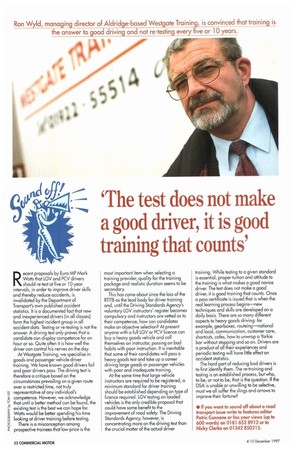'The test does not make a good driver, it is good training that counts'
Page 54

If you've noticed an error in this article please click here to report it so we can fix it.
Recent proposals by Euro MP Mark Watts that LGV and PCV drivers should re-test at five or 10-year intervals, in order to improve driver skills and thereby reduce accidents, is invalidated by the Department of Transport's own published accident statistics. It is a documented fact that new and inexperienced drivers (in all classes) form the highest incident group in all accident data. Testing or re-testing is not the answer. A driving test only proves that a candidate can display competence for an hour or so. Quite often it is how well the driver can control his nerves on the day.
At Westgate Training, we specialise in goods and passenger vehicle driver training. We have known good drivers fail and poor drivers pass. The driving test is therefore a critique based on the circumstances prevailing on a given route over a restricted time, not truly representative of any individual's competence. However, we acknowledge that until a better method can be found, the existing test is the best we can hope for. Watts would be better spending his time looking at driver training before testing. There is a misconception among prospective trainees that low price is the most important item when selecting a training provider, quality for the training package and realistic duration seems to be secondary. This has come about since the loss of the RTITB as the lead body for driver training and, until the Driving Standards Agency's voluntary LGV instructors' register becomes compulsory and instructors are vetted as to their competence, how can candidates make an objective selection? At present anyone with a full LGV or PCV licence can buy a heavy goods vehicle and call themselves an instructor, passing on bad habits with poor instruction. It is inevitable that some of their candidates will pass a heavy goods test and take up a career driving large goods or passenger vehicles with poor and inadequate training. At the same time that large vehicle instructors are required to be registered, a minimum standard for driver training should be established depending on type of licence required. LGV testing on loaded vehicles is the only credible proposal that could have some benefit to the improvement of road safety. The Driving Standards Agency, however, is concentrating more on the driving test than the crucial matter of the actual driver training. While testing to a given standard is essential, proper tuition and attitude to the training is what makes a good novice driver. The test does not make a good driver, it is good training that counts. Once a pass certificate is issued that is when the real learning process begins—new techniques and skills are developed on a daily basis. There are so many different aspects to heavy goods driving: for example, gearboxes, routeing—national and local, communication, customer care, shortcuts, cafes, how to unwrap a Yorkie bar without stopping and so on. Drivers are a product of all their experiences and periodic testing will have little effect on accident statistics.
The hard part of reducing bad drivers is to first identify them The re-training and testing is an established process, but who, to be, or not to be, that is the question. If the DSA is unable or unwilling to be selective, must we all suffer the slings and arrows to improve their fortune?
















































































































